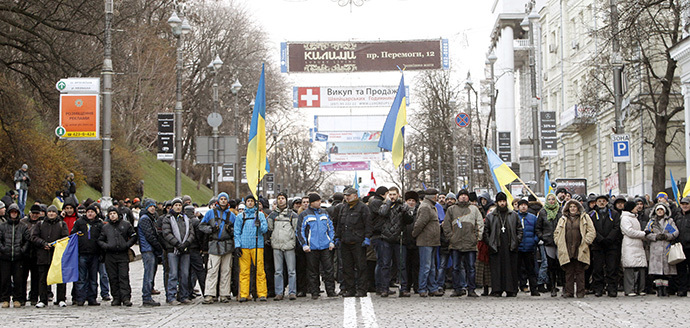Ukraine’s pro-EU opposition leaders jetted to Germany for talks with Angela Merkel on Monday as the country took a small step to resolving its worst post-Soviet crisis with the adoption of a political amnesty.
Ukraine's pro-EU opposition leaders jetted to Germany for talks with Angela Merkel on Monday as the country took a small step to resolving its worst post-Soviet crisis with the adoption of a political amnesty.
A law dropping criminal charges against hundreds of protesters came into force a day after they left municipal buildings occupied in December in response to President Viktor Yanukovych's decision to reject an EU trade deal in favour of closer ties with Russia.
However nearly three months after the protests began, the opposition remains firmly entrenched in a sprawling tent city on Kiev's central Independence Square. Activists have also been allowed to continue occupying several public buildings.
Yanukovych proposed the amnesty at the beginning of the month as he sought to pacify protesters following deadly clashes in Kiev in January.
"Something very important has happened. We have proved that we do not abandon our comrades in trouble," said nationalist Svoboda (Freedom) party leader Oleg Tyagnybok.
Vitali Klitschko, a former champion boxer turned opposition leader, on Monday called on the authorities to pardon the hundreds of activists who are currently being held under house arrest.
"The authorities are still keeping hostages. That's unacceptable," he said before leaving for Germany.
Some of the protesters who had their charges lifted under the amnesty had been facing jail terms of up to 15 years.
Klitschko and Arseniy Yatsenyuk, another opposition leader, were set to meet Merkel in Berlin later Monday.
Klitschko's office said he planned to discuss "the political situation in Ukraine and the prospect of bringing in EU sanctions against representatives of the Yanukovych regime".
Klitschko was also scheduled to meet German Foreign Minister Frank-Walter Steinmeier, his office said.
"We need help. We don't need words, we need action," Yatsenyuk told tens of thousands of protesters on Independence Square on Sunday.
"We want Europe to say clearly what package of economic measures it can offer us."